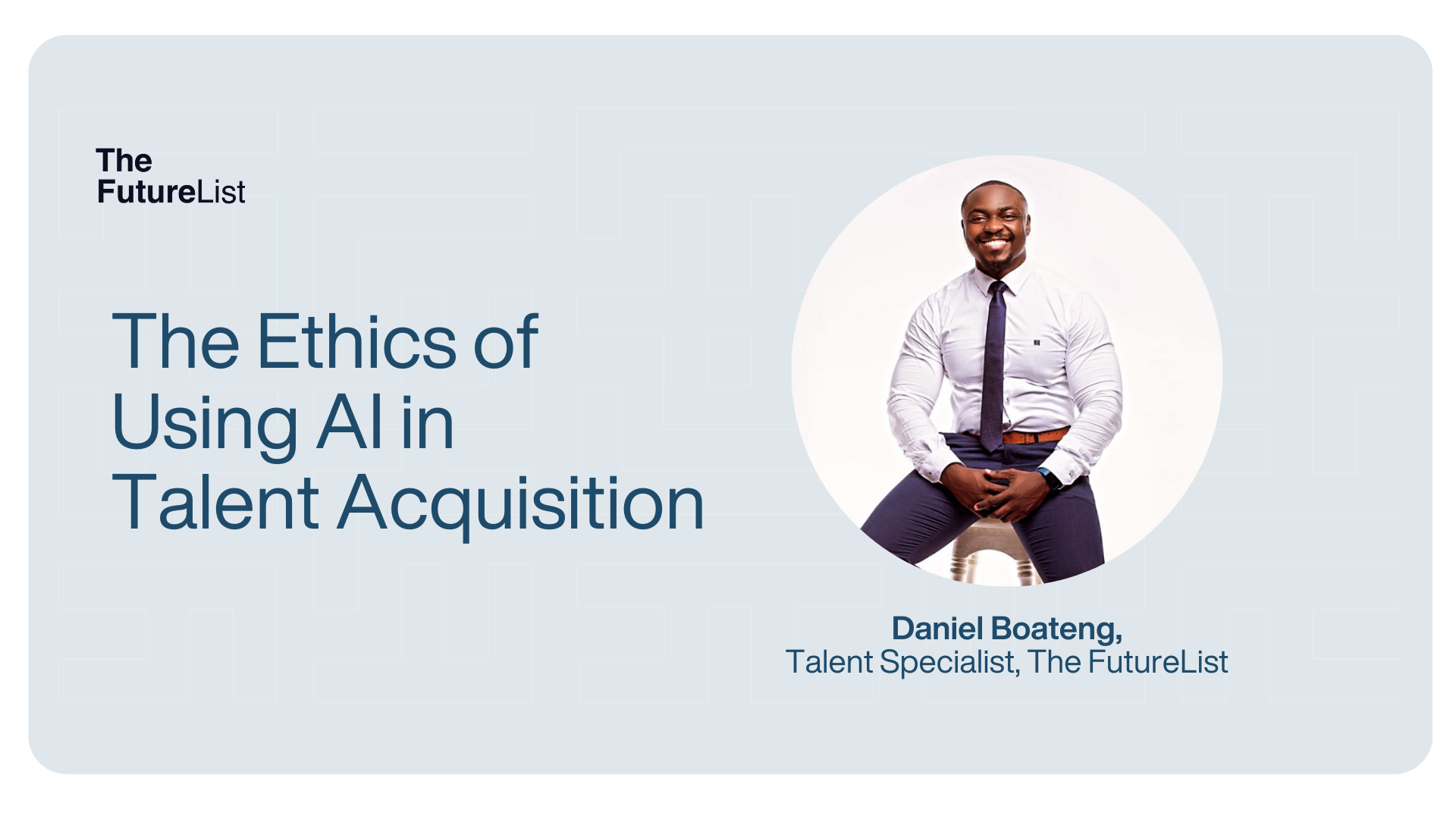
The Ethics of Using AI in Talent Acquisition
Artificial Intelligence (AI) is revolutionising the way organisations identify, assess, and hire prospective candidates. While the adoption of AI in this field brings undeniable benefits, it also raises critical ethical considerations that demand thoughtful exploration. In this blog post, we delve into the ethical dimensions surrounding the use of AI in talent acquisition and the imperative for organisations to strike a balance between innovation and responsibility.
Unbiased Recruitment:
AI in talent acquisition has the potential to streamline and optimise the hiring process, but it’s crucial to ensure that these systems remain unbiased. Algorithms are only as impartial as the data they are trained on. If historical hiring data reflects biases, AI systems can inadvertently perpetuate and even exacerbate those biases.
Organisations must be vigilant in reviewing and auditing their AI algorithms regularly to identify and rectify any biases. Additionally, transparency in the recruitment process is paramount. Candidates deserve to know if AI is playing a role in their assessment and how these systems operate to ensure fair and equitable treatment.
Data Privacy and Security:
As AI systems rely heavily on data, particularly personal information, safeguarding data privacy is a non-negotiable ethical imperative. Organisations must be transparent about the data they collect, how it is used, and how long it is retained. Obtaining informed consent from candidates regarding data usage is a fundamental ethical practice.
Moreover, robust cybersecurity measures are essential to protect sensitive candidate information from unauthorised access or malicious use. The ethical responsibility extends beyond the recruitment phase, encompassing the entire data lifecycle.
Explainability and Transparency:
One of the ethical challenges associated with AI is the so-called “black box” problem, where the decision-making process of AI algorithms is opaque and difficult to interpret. In talent acquisition, candidates have the right to understand how decisions about their suitability are made.
Organisations should prioritise the development of AI systems that are explainable and transparent. This not only fosters trust among candidates but also allows organisations to identify and rectify any issues that may arise in the decision-making process.
Mitigating Algorithmic Bias:
Addressing bias in AI algorithms requires a multi-faceted approach. Beyond regularly auditing algorithms, organisations should invest in diverse and representative training datasets. This helps ensure that AI systems recognize and appreciate the diversity of talent, mitigating the risk of inadvertently excluding qualified candidates from underrepresented groups.
Continuous monitoring and adjustment of algorithms are essential to stay ahead of emerging biases and to respond promptly when they are identified. Ethical AI practices demand an ongoing commitment to fairness and inclusivity.
Human-AI Collaboration:
While AI can enhance efficiency in talent acquisition, it should not replace the human touch. Human intuition, empathy, and contextual understanding are irreplaceable aspects of the recruitment process. AI should be viewed as a tool to augment human capabilities, not replace them.
Organisations should maintain open lines of communication between human recruiters and AI systems. This collaboration ensures that ethical considerations are at the forefront of decision-making, combining the strengths of both human and machine intelligence.
Balancing Innovation with Responsibility
As AI continues to reshape the landscape of talent acquisition, the ethical considerations surrounding its use become increasingly paramount. Striking a balance between innovation and responsibility is not only a moral imperative but also a strategic one. Ethical talent acquisition practices foster a positive organisational reputation, attract top talent, and contribute to a diverse and inclusive workplace.
In the dynamic intersection of technology and human resources, organisations must commit to ethical AI practices that prioritise fairness, transparency, and privacy. By doing so, they can harness the transformative power of AI while ensuring that the future of talent acquisition is not just technologically advanced but ethically sound.
At The FutureList, we understand the importance of building a strong tech team that aligns with your specific goals and requirements. Our dedicated team of experts and talent partners are here to provide personalised advisory sessions to assist you in assembling a top-notch tech team through navigating the complexities of talent acquisition and creating a dynamic team that drives your organisation’s success. Don’t hesitate to reach out to schedule an advisory call here.
Get innovation insights from The FutureList weekly. Subscribe to our newsletter here.
Categories
- Agritech
- Artificial Intelligence
- Biotech
- Blockchain
- Climate Tech
- Data Infrastructure
- Edtech
- Events
- Fashion
- Fintech
- Healthtech
- Infrastructure
- Innovation Memos
- Innovation Scout Program
- Insight
- Insurtech
- Machine Learning
- Martech
- Mobility
- Music and Media
- Partner Offers
- Perks
- Procurement
- Proptech
- Retailtech
- Ridehailing
- Ridesharing
- Robotics
- Space Aviation
- Supply Chain
- Talent
- Telecoms
- Uncategorized
- Venture Capital
- Wastetech
- Women In Tech